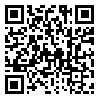BibTeX | RIS | EndNote | Medlars | ProCite | Reference Manager | RefWorks
Send citation to:
URL: http://journal.muq.ac.ir/article-1-323-en.html

 , Firouz Ebrahim *
, Firouz Ebrahim * 
 2, Abbas Hajizadeh1
2, Abbas Hajizadeh1 
 , Shahram Nazarian1
, Shahram Nazarian1 
 , Jamil Zargan1
, Jamil Zargan1 
 , Jamal Rashidiani3
, Jamal Rashidiani3 

2- Imam Hossein University ,
3- Baqiyatallah University of Medical Sciences
Background and Objectives: Botulism syndrome is caused by serotypes A-G of neurotoxins of Clostridium genus. Neurotoxin binding domain is an appropriate vaccine candidate due to its immunogenic activity. In this study, the immunogenicity of chitosan-based botulinum neurotoxin E binding domain recombinant candidate vaccine was investigated via mucosal route of administration.
Methods: In this experimental study, chitosan nanoparticles containing rBoNT/E protein were synthesized by ionic gelation method and were administered orally and intranasally to mice. After each administration, IgG antibody titer was measured by ELISA method. Finally, all groups were challenged with active botulinum neurotoxin type E. Data were analyzed using Duncan and repeated ANOVA tests. The significance level was considered as p<0.05.
Results: After each administration, IgG antibody titre was increased in all the test groups (except the control group). According to the results of challenge with active botulinum neurotoxin type E, the mice immunized orally and intranasally by nanoparticles containing the antigen and also the mice that only received the antigen orally, could tolerate 500 folds of LD50. The group immunized intranasally with only antigen tolerated 2000 folds of LD50.
Conclusion: The results of this research showed that use of chitosan nanoparticles has no significant increase in the immunogenicity of recombinant botulinum neurotoxin antigen in oral and intranasal routes (p>0.05), even intranasal route reduced the immunogenicity.
Received: 2016/02/23 | Accepted: 2016/02/24 | Published: 2016/12/25
| Rights and permissions | |
 |
This work is licensed under a Creative Commons Attribution-NonCommercial 4.0 International License. |





